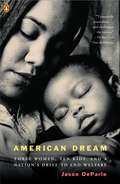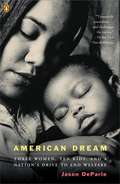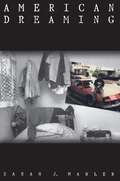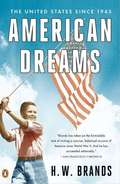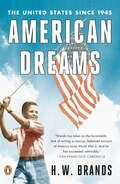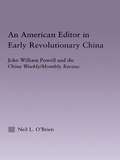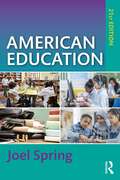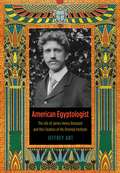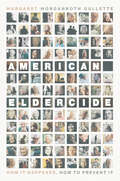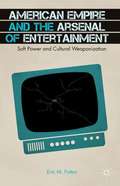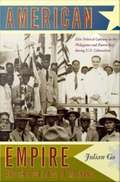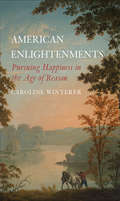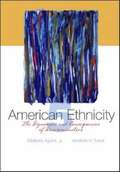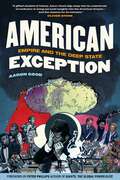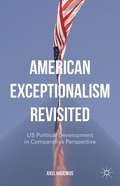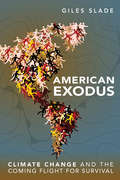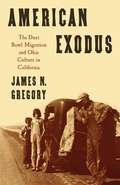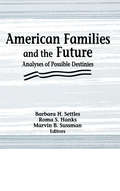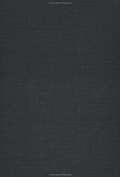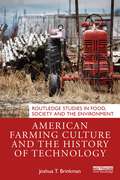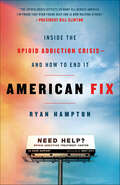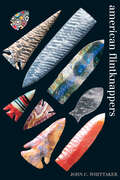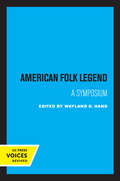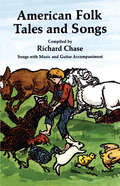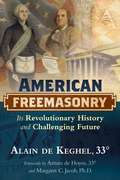- Table View
- List View
American Dream
by Jason DeparleIn this definitive work, two-time Pulitzer finalist Jason DeParle cuts between the mean streets of Milwaukee and the corridors of Washington to produce a masterpiece of literary journalism. At the heart of the story are three cousins whose different lives follow similar trajectories. Leaving welfare, Angie puts her heart in her work. Jewell bets on an imprisoned man. Opal guards a tragic secret that threatens her kids and her life. DeParle traces their family history back six generations to slavery and weaves poor people, politicians, reformers, and rogues into a spellbinding epic. With a vivid sense of humanity, DeParle demonstrates that although we live in a country where anyone can make it, generation after generation some families don't. To read American Dream is to understand why.
American Dream: Three Women, Ten Kids, and a Nation's Drive to End Welfare
by Jason DeparleIn this definitive work, two-time Pulitzer finalist Jason DeParle cuts between the mean streets of Milwaukee and the corridors of Washington to produce a masterpiece of literary journalism. At the heart of the story are three cousins whose different lives follow similar trajectories. Leaving welfare, Angie puts her heart in her work. Jewell bets on an imprisoned man. Opal guards a tragic secret that threatens her kids and her life. DeParle traces their family history back six generations to slavery and weaves poor people, politicians, reformers, and rogues into a spellbinding epic. With a vivid sense of humanity, DeParle demonstrates that although we live in a country where anyone can make it, generation after generation some families don't. To read American Dream is to understand why.
American Dreaming: Immigrant Life on the Margins
by Sarah J. MahlerAmerican Dreaming chronicles in rich detail the struggles of immigrants who have fled troubled homelands in search of a better life in the United States, only to be marginalized by the society that they hoped would embrace them. Sarah Mahler draws from her experiences living among undocumented Salvadoran and South American immigrants in a Long Island suburb of Manhattan. In moving interviews they describe their disillusionment with life in the United States but blame themselves individually or as a whole for their lack of economic success and not the greater society. As she explores the reasons behind this outlook, the author argues that marginalization fosters antagonism within ethnic groups while undermining the ethnic solidarity emphasized by many scholars of immigration. Mahler's investigation leads to conditions that often bar immigrants from success and that they cannot control, such as residential segregation, job exploitation, language and legal barriers, prejudice and outright hostility from their suburban neighbors. Some immigrants earn surplus income by using private cars as taxis, subletting space in apartments to lower rent burdens, and filling out legal forms and applications--in essence generating institutions largely parallel to those of the mainstream society whereby only a small group of entrepreneurs can profit. By exacting a price for what used to be acts of reciprocal good will in the homeland, these entrepreneurs leave people who had expected to be exploited by "Americans" feeling victimized by their own.
American Dreams: The United States Since 1945
by H. W. BrandsTHE STORY OF OUR NATION FROM THE A - BOMB TO THE iPHONE <p><p>For a brief moment in 1945, America stood at its apex, looking back on victory not only against the Axis powers but also against the Great Depression, and looking ahead to a seemingly limitless future. What we've done in the six decades since is a vitally important and fascinating topic that has rarely been tackled in one volume. Covering the highs and lows, politics to pop culture, H. W. Brands, one of today's preeminent historians, creates a character-driven narrative that chronicles the great themes and events that have driven America-a still unfolding legacy of dreams born out of a global cataclysm. <p> 'A crisp, balanced account of America. ' - THE ECONOMIST <p> 'Brands weaves together keen political history with anecdote and marvellous sense of place to produce a vivid tableau. ' - THE BOSTON GLOBE <p> 'Brands knows how to write narrative and how to make the complex comprehensible. ' - JONATHAN YARDLEY, THE WASHINGTON POST BOOK WORLD
American Dreams: The United States Since 1945
by H. W. BrandsFrom bestselling historian H. W. Brands, an incisive chronicle of the events and trends that guided-and sometimes misguided-our nation from the A-bomb to the iPhone. For a brief, bright moment in 1945, America stood at its apex, looking back on victory not only against the Axis powers but against the Great Depression, and looking ahead to seemingly limitless power and promise. What we've done with that power and promise over the past six decades is a vitally important and fascinating topic that has rarely been tackled in one volume, and never by a historian of H. W. Brands's stature. As American Dreams opens, Brands shows us a country dramatically different from our own-more unequal in social terms but more equal economically, more religious and rural but also more liberal and more wholeheartedly engaged with the rest of the world. As he traces the changes we have gone through as a nation, he reveals the great themes and dreams that have driven America-the rising focus on individual rights and pleasures, the growing distance between our global goals and those of the rest of the world, and the inexorable dissolution of a shared sense of what it means to be American. In Brands's adroit hands, these trends unfold through a character-driven narrative that sheds brilliant light on the obvious highs and lows-from Watergate to the Berlin Wall, from Apollo 11 to 9/11, from My Lai to shock and awe. But he also chronicles the surprising impact of less celebrated events and trends. Through his eyes, we realize the sweeping significance of the immigration reforms of the 1960s, which gradually transformed American society. We come to grasp the vast impact of abandoning the gold standard in 1971, which enabled both globalization and the current financial crisis. We ponder the unnerving results of CNN's debut in 1979, which sped up the news cycle and permanently changed our foreign policy by putting its effects live on our TV screens. Blending political and cultural history with his keen sense of the spirit of the times, Brands captures the national experience through the last six decades and reveals the still-unfolding legacy of dreams born out of a global cataclysm.
American Editor in Early Revolutionary China: John William Powell and the China Weekly/Monthly Review
by Neil O'BrienThis is a study of Sino-American relations and the editorial policy of the China Weekly Review / China Monthly Review , published in Shanghai by John William Powell during the Chinese Civil War and the Korean War. The Review supported US attempts in early 1946 to avert civil war through the creation of a coalition government. By 1947 it reflected growing disillusionment with Guomindang policies, and increasing sympathy for the demands of impoverished students and faculty for multi-party democracy and peace. As the Civil War shifted in favour of the Communists in late 1948, Powell and the Review counseled US businessmen to remain in Shanghai and urged the US government to establish working relations with the Communists, and later to recognize the new regime. Staying in Shanghai to report changes engendered by the Communist victory, the Review 's staff accomodated themselves to the new orthodoxy and to the regime's coordination of the press. During the Korean War, the Review opposed the expanding US air war, becoming the foremost American purveyor of Chinese and North Korean allegations of American use of bacteriological weapons. The Review was also utilized for the political indoctrination of US prisoners-of-war by the Chinese and North Koreans. After closing the Review in July 1953 and returning to the United States, Powell, his wife Sylvia Campbell and assistant editor Julian Schuman were put on trial for sedition. As the government narrowed its focus to the bacteriological warfare issue, Powell and his lawyers countered by trying to prove the veracity of the charges, seeking witnesses in China and North Korea. Adverse publicity led to a mistrial in January 1959 and limitations in both the sedition and treason statutes ended plans to renew prosecution. Powell and the Review had insisted that positive diplomatic and economic relations between China and the United States were both possible and desirable. The gradual normalization of trade, investment and political relations since the 1970s seemed to validate this belief. In the post-Cold War age when Sino-American relations are often strained and tempestuous, this book serves as a reminder of the value of making the extra effort to achiece understanding.
American Education (Sociocultural, Political, and Historical Studies in Education)
by Joel SpringFeaturing current information and challenging perspectives on the latest issues and forces shaping the American educational system—with scholarship that is often cited as a primary source—Joel Spring introduces readers to the historical, political, social and legal foundations of education and to the profession of teaching in the United States. In his signature straightforward, concise approach to describing complex issues, he illuminates events and topics that are often overlooked or whitewashed, giving students the opportunity to engage in critical thinking about education. Students come away informed on the latest topics, issues and data and with a strong knowledge of the forces shaping the American educational system. Updated throughout, the 21st edition of this clear, authoritative text remains fresh and up-to-date, reflecting the many changes in education that have occurred since the publication of the previous edition. New coverage includes: Discussion of “culture wars” and critical race theory Parental rights versus the goals of common education LGBTQIA+ students’ rights Discussion of the current administration’s educational policies
American Egyptologist: The Life of James Henry Breasted and the Creation of His Oriental Institute
by Jeffrey AbtJames Henry Breasted (1865-1935) had a career that epitomizes our popular image of the archaeologist. Daring, handsome, and charismatic, he traveled on expeditions to remote and politically unstable corners of the Middle East, helped identify the tomb of King Tut, and was on the cover of Time magazine. But Breasted was more than an Indiana Jones--he was also an accomplished scholar, academic entrepreneur, and talented author who brought ancient history to life not just for students but for such notables as Teddy Roosevelt and Sigmund Freud. In American Egyptologist, Jeffrey Abt weaves together the disparate strands of Breasted's life, from his small-town origins following the Civil War to his evolution into the father of American Egyptology and the founder of the Oriental Institute in the early years of the University of Chicago. Abt explores the scholarly, philanthropic, diplomatic, and religious contexts of his ideas and projects, providing insight into the origins of America's most prominent center for Near Eastern archaeology. An illuminating portrait of the nearly forgotten man who demystified ancient Egypt for the general public, American Egyptologist restores James Henry Breasted to the world and puts forward a brilliant case for his place as one of the most important scholars of modern times.
American Eldercide: How It Happened, How to Prevent It
by Margaret Morganroth GulletteA bracing spotlight on the avoidable causes of the COVID-19 Eldercide in the United States. Twenty percent of the Americans who have died of COVID since 2020 have been older and disabled adults residing in nursing homes—even though they make up fewer than one percent of the US population. Something about this catastrophic loss of life in government-monitored facilities has never added up. Until now. In American Eldercide, activist and scholar Margaret Morganroth Gullette investigates this tragic public health crisis with a passionate voice and razor-sharp attention to detail, showing us that nothing about it was inevitable. By unpacking the decisions that led to discrimination against nursing home residents, revealing how governments, doctors, and media reinforced ageist or ableist biases, and collecting the previously little-heard voices of the residents who survived, Gullette helps us understand the workings of what she persuasively calls an eldercide. Gullette argues that it was our collective indifference, fueled by the heightened ageism of the COVID-19 era, that prematurely killed this vulnerable population. Compounding that deadly indifference is our own panic about aging and a social bias in favor of youth-based decisions about lifesaving care. The compassion this country failed to muster for the residents of our nursing facilities motivated Gullette to pen an act of remembrance, issuing a call for pro-aging changes in policy and culture that would improve long-term care for everyone.
American Empire and the Arsenal of Entertainment
by Eric M. FattorMovies, television, and American culture permeates even the most remote reaches of the globe in unprecedented levels. What affect does the spread of the American zeitgeist have on global perceptions of the US? This book analyzes the complex role entertainment plays in foreign policy - weighing its benefits and setbacks to national interests abroad.
American Empire and the Politics of Meaning: Elite Political Culture in the Philippines and Puerto Rico During U.S. Colonialism
by Julian GoWhen the United States took control of the Philippines and Puerto Rico in the wake of the Spanish-American War, it declared that it would transform its new colonies through lessons in self-government and the ways of American-style democracy. In both territories, U. S. colonial officials built extensive public school systems, and they set up American-style elections and governmental institutions. The officials aimed their lessons in democratic government at the political elite: the relatively small class of the wealthy, educated, and politically powerful within each colony. While they retained ultimate control for themselves, the Americans let the elite vote, hold local office, and formulate legislation in national assemblies. American Empire and the Politics of Meaning is an examination of how these efforts to provide the elite of Puerto Rico and the Philippines a practical education in self-government played out on the ground in the early years of American colonial rule, from 1898 until 1912. It is the first systematic comparative analysis of these early exercises in American imperial power. The sociologist Julian Go unravels how American authorities used "culture" as both a tool and a target of rule, and how the Puerto Rican and Philippine elite received, creatively engaged, and sometimes silently subverted the Americans' ostensibly benign intentions. Rather than finding that the attempt to transplant American-style democracy led to incommensurable "culture clashes," Go assesses complex processes of cultural accommodation and transformation. By combining rich historical detail with broader theories of meaning, culture, and colonialism, he provides an innovative study of the hidden intersections of political power and cultural meaning-making in America's earliest overseas empire.
American Enlightenments: Pursuing Happiness in the Age of Reason
by Caroline WintererA provocative reassessment of the concept of an American golden age of European-born reason and intellectual curiosity in the years following the Revolutionary War The accepted myth of the "American Enlightenment" suggests that the rejection of monarchy and establishment of a new republic in the United States in the eighteenth century was the realization of utopian philosophies born in the intellectual salons of Europe and radiating outward to the New World. In this revelatory work, Stanford historian Caroline Winterer argues that a national mythology of a unitary, patriotic era of enlightenment in America was created during the Cold War to act as a shield against the threat of totalitarianism, and that Americans followed many paths toward political, religious, scientific, and artistic enlightenment in the 1700s that were influenced by European models in more complex ways than commonly thought. Winterer's book strips away our modern inventions of the American national past, exploring which of our ideas and ideals are truly rooted in the eighteenth century and which are inventions and mystifications of more recent times.
American Ethnicity: The Dynamics and Consequences of Discrimination (5th Edition)
by Jonathan H. Turner Adalberto Aguirre Jr.This text introduces the dynamics of racial and ethnic relations.
American Exception: Empire and the Deep State
by Aaron GoodAmerican Exception seeks to explain the breakdown of US democracy. In particular, how we can understand the uncanny continuity of American foreign policy, the breakdown of the rule of law, and the extreme concentration of wealth and power into an overworld of the corporate rich. To trace the evolution of the American state, the author takes a deep politics approach, shedding light on those political practices that are typically repressed in &“mainstream&” discourse. In its long history before World War II, the US had a deep political system—a system of governance in which decision-making and enforcement were carried out within—and outside of—public institutions. It was a system that always included some degree of secretive collusion and law-breaking. After World War II, US elites decided to pursue global dominance over the international capitalist system. Setting aside the liberal rhetoric, this project was pursued in a manner that was by and large imperialistic rather than progressive. To administer this covert empire, US elites created a massive national security state characterized by unprecedented levels of secrecy and lawlessness. The &“Global Communist Conspiracy&” provided a pretext for exceptionism—an endless &“exception&” to the rule of law. What gradually emerged after World War II was a tripartite state system of governance. The open democratic state and the authoritarian security state were both increasingly dominated by an American deep state. The term deep state was badly misappropriated during the Trump era. In the simplest sense, it herein refers to all those institutions that collectively exercise undemocratic power over state and society. To trace how we arrived at this point, American Exception explores various deep state institutions and history-making interventions. Key institutions involve the relationships between the overworld of the corporate rich, the underworld of organized crime, and the national security actors that mediate between them. History-making interventions include the toppling of foreign governments, the launching of aggressive wars, and the political assassinations of the 1960s. The book concludes by assessing the prospects for a revival of US democracy.
American Exceptionalism Revisited
by Axel HadeniusAmerican Exceptionalism Revisited provides a broad overview of the various features that signify American politics. These include the upholding of an exceptional political stability, involving a particular balance between legislative, executive and judicial powers, and the permanence of a unique party system. Furthermore, special traits in the electoral realm'e. g. , voter turnout, the inflow of money, and the application of primaries'are targets of analysis. Through comparisons with conditions applying abroad, particularly in Europe and Latin America, Axel Hadenius reveals a number of new insights on American political life, both today and over time
American Exodus
by Giles SladeAs temperatures rise, declines in agricultural production and freshwater supply will diminish US carrying capacity by 2/3, and rising sea levels will impact the country's most densely populated regions. A frightening survey of what's to come, American Exodus argues that mankind can survive the coming century of climate chaos if we act quickly to preserve our shelter of last resort.
American Exodus: The Dust Bowl Migration And Okie Culture In California
by James N. GregoryFifty years ago, John Steinbeck's now classic novel, The Grapes of Wrath, captured the epic story of an Oklahoma farm family driven west to California by dust storms, drought, and economic hardship. It was a story that generations of Americans have also come to know through Dorothea Lange's unforgettable photos of migrant families struggling to make a living in Depression-torn California. Now in James N. Gregory's pathbreaking American Exodus, there is at last an historical study that moves beyond the fiction and the photographs to uncover the full meaning of these events. American Exodus takes us back to the Dust Bowl migration of the 1930s and the war boom influx of the 1940s to explore the experiences of the more than one million Oklahomans, Arkansans, Texans, and Missourians who sought opportunities in California. Gregory reaches into the migrants' lives to reveal not only their economic trials but also their impact on California's culture and society. He tracesthe development of an "Okie subculture" that over the years has grown into an essential element in California's cultural landscape. The consequences, however, reach far beyond California. The Dust Bowl migration was part of a larger heartland diaspora that has sent millions of Southerners and rural Midwesterners to the nation's northern and western industrial perimeter. American Exodus is the first book to examine the cultural implications of that massive 20th-century population shift. In this rich account of the experiences and impact of these migrant heartlanders, Gregory fills an important gap in recent American social history.
American Families and the Future: Analyses of Possible Destinies
by Marvin B Sussman Barbara H Settles Roma S HanksAs the world heads into the twenty-first century, individuals and their families are being confronted with a more diverse array of possible life experiences than has ever existed before. Changes in longevity, marriage, fertility, employment, and many other areas have created new opportunities for individual and family choice and variability in life course experiences. American Families and the Future discusses a variety of issues that face and will continue to families in coming years and describes various strategies families can use in their decisionmaking processes.This enlightening book is divided into five main sections: Demographic Issues; Social and Economic Issues; Technological Issues; Family Process in Shaping the Future; and Family Vision in Creating the Future. Individual chapters view family problem solving from a variety of perspectives and disciplines.American Families and the Future: describes recent demographic trends and considers their implications for how individuals and their families plan and prepare for their later adult life reviews health care issues and concerns for the elderly and addresses strategies for self-health promotion and illness prevention provides examples illustrating the uses and abuses of data to promote partisan views and agendas outlines a conceptual framework that can be uses to understand problem solving and decisionmaking by individuals and family groups presents a model that explores family decisionmaking, focusing on the conditions under which decisions are made presents findings from a study of early adolescents’perceptions of their role in family decisionmakingThe book closes with an upbeat discussion of possible solutions to current pathologies affecting human societies and cultures. Professionals who work with families will find this book an enlightening and encouraging guide for helping families cope with the myriad issues and choices they face in planning for their futures.
American Families: A Multicultural Reader
by Stephanie Coontz Maya Parson Gabrielle RaleyThis collection testifies to the extraordinary variety of families in the U.S, revealing that family arrangements have always been diverse and have often been in flux. Case studies describe the wide array of family forms and values, gender roles, and parenting practices.
American Farming Culture and the History of Technology (Routledge Studies in Food, Society and the Environment)
by Joshua T. BrinkmanPresenting a history of agriculture in the American Corn Belt, this book argues that modernization occurred not only for economic reasons but also because of how farmers use technology as a part of their identity and culture.Histories of agriculture often fail to give agency to farmers in bringing about change and ignore how people embed technology with social meaning. This book, however, shows how farmers use technology to express their identities in unspoken ways and provides a framework for bridging the current rural-urban divide by presenting a fresh perspective on rural cultural practices. Focusing on German and Jeffersonian farmers in the 18th century and Corn Belt producers in the 1920s, the Cold War, and the recent period of globalization, this book traces how farmers formed their own versions of rural modernity. Rural people use technology to contest urban modernity and debunk yokel stereotypes and women specifically employed technology to resist urban gender conceptions. This book shows how this performance of rural identity through technological use impacts a variety of current policy issues and business interests surrounding contemporary agriculture from the controversy over genetically modified organisms and hog confinement facilities to the growth of wind energy and precision technologies. Inspired by the author's own experience on his family’s farm, this book provides a novel and important approach to understanding how farmers’ culture has changed over time, and why machinery is such a potent part of their identity.This book will be of great interest to students and scholars of agricultural history, technology and policy, rural studies, the history of science and technology, and the history of farming culture in the USA.
American Fix: Inside the Opioid Addiction Crisis—and How to End It
by Ryan HamptonNearly every American knows someone who has been affected by the opioid crisis. Addiction is a trans-partisan issue that impacts individuals from every walk of life. Millions of Americans, tired of watching their loved ones die while politicians ignore this issue. Where is the solution? Where is the hope? Where's the outrage?Ryan Hampton is a young man who has made addiction and recovery reform his life's mission. Through the wildly successful non-profit organization Facing Addiction, Hampton has been rocketed to the center of America’s rising recovery movement—quickly emerging as the de facto leader of the national conversation on addiction. He understands firsthand how easy it is to develop a dependency on opioids, and how destructive it can quickly become. Now, he is waging a permanent campaign to change our way of thinking about and addressing addiction in this country.In American Fix, Hampton describes his personal struggle with addiction, outlines the challenges that the recovery movement currently faces, and offers a concrete, comprehensive plan of action towards making America’s addiction crisis a thing of the past.
American Flintknappers: Stone Age Art in the Age of Computers
by John C. Whittaker&“An important resource for students of modern replication studies . . . Of interest to anyone studying folk technologies in general.&” ―The Journal of the Royal Anthropological Institute Making arrowheads, blades, and other stone tools was once a survival skill and is still a craft practiced by thousands of flintknappers around the world. In the United States, knappers gather at regional &“knap-ins&” to socialize, exchange ideas and material, buy and sell both equipment and knapped art, and make stone tools in the company of others. In between these gatherings, the knapping community stays connected through newsletters and the Internet. In this book, avid knapper and professional anthropologist John Whittaker offers an insider&’s view of the knapping community. He explores why stone tools attract modern people and what making them means to those who pursue this art. He describes how new members are incorporated into the knapping community, how novices learn the techniques of knapping and find their roles within the group, how the community is structured, and how ethics, rules, and beliefs about knapping are developed and transmitted. He also explains how the practice of knapping relates to professional archaeology, the trade in modern replicas of stone tools, and the forgery of artifacts. Whittaker's book thus documents a fascinating subculture of American life and introduces the wider public to an ancient and still rewarding craft. &“This is a superb book, authored by one of the only people with both the anthropological background and the connections in the world of contemporary flintknapping to write it. It really is unlike any work I&’m aware of in lithics studies.&” —Michael Stafford, Director, Cranbrook Institute of Science
American Folk Legend: A Symposium
by Wayland D. HandThis title is part of UC Press's Voices Revived program, which commemorates University of California Press’s mission to seek out and cultivate the brightest minds and give them voice, reach, and impact. Drawing on a backlist dating to 1893, Voices Revived makes high-quality, peer-reviewed scholarship accessible once again using print-on-demand technology. This title was originally published in 1971.
American Folk Tales and Songs (Dover Books on Music)
by Richard ChaseEver heard the story about the hoe-handle that was bitten by a snake? Or the one about the man in the kraut tub? These and many more tales of wry complexion are included in this collection of uninhibited tales and ballads of the Anglo-American tradition. Collected in the Appalachians, the folklore in this book reflects the hardships, humor, and creative instinct of the robust men and women who have lived in the hills of Carolina, Tennessee, and Kentucky for centuries.Mr. Chase has collected a wide variety of folklore for inclusion in this volume. Here you will find tales of dry humor whose telling will enliven any friendly gathering, or the "jump" tales that literally require the teller to jump at his listener, mostly ghost stories that have enthralled generations of children and grandchildren. Here, complete with guitar chords, are American versions of old English ballads like "The Devil's Questions" and "Bold Robin Hood," and original mountain ballads like "Old Bangum and the Boar." Here too are many hymns and children's songs current in the mountains of the South. A sample of fiddle music and country games can provide inspiration for all manner of parties or family amusements. In addition to the ballads, songs, and stories, Mr. Chase also gives such amusing folk miscellany as riddles, love-rhymes, and jokes. For anyone who seeks a wider familiarity with folk materials, Mr. Chase provides an ample list of suggested further reading and an amateur collector's guide. Notes accompanying each item identify the informant or origin and give details concerning the author's editing "For popular use."American Folk Tales and Songs is meant to be used. The author, one of America's foremost folklorists, has presented his stories and songs so that they can increase the repertory of both storytellers and fireside singers, for folk traditions can live only through the voices and imaginations of those who love good stories and good songs.
American Freemasonry: Its Revolutionary History and Challenging Future
by Margaret C. Jacob Alain De Keghel Arturo De HoyosExplores the American Masonic system and its strengths and failings • Examines the history of Freemasonry in the United States from the colonial era and the Revolutionary War to the rise of the Scottish branch onward • Investigates the racial split in American Freemasonry between black lodges and white and how, unlike French lodges, women are ineligible to become Masons in the U.S. • Reveals the factors that have resulted in shrinking Masonic enrollment in America and explores the revitalization work done by the Grand Lodge of California Freemasonry bears the imprint of the society in which it exists, and Freemasonry in North America is no exception. While keeping close ties to French lodges until 1913, American Freemasonry was also deeply influenced by the experiences of many early American political leaders, leading to distinctive differences from European lodges. Offering an unobstructed view of the American system and its strengths and failings, Alain de Keghel, an elder of the Grand Orient de France and, since 1999, a lifetime member of the Scottish Rite Research Society (Southern U.S. jurisdiction), examines the history of Freemasonry in the United States from the colonial era to the Revolutionary War to the rise of the Scottish branch onward. He reveals the special relationship between the French Masonic hero, the Marquis de Lafayette, and the Founding Fathers, especially George Washington and Benjamin Franklin, including French Freemasonry’s role in the American Revolution. He also explores Franklin’s Masonic membership, including how he was Elder of the lodge of the Nine Sisters in Paris. The author investigates the racial split in American Freemasonry between black lodges and white and how, unlike French lodges, women are ineligible to become Masons in the U.S. He examines how American Freemasonry has remained deeply religious across the centuries and forbids discussion of religious or social issues in its lodges, unlike some branches of French Freemasonry, which removed belief in God as a prerequisite for membership in 1877 and whose lodges operate in some respects as philosophical debating societies. Revealing the factors that have resulted in shrinking Masonic enrollment in America, the author explores the revitalization work done by the Grand Lodge of California and sounds the call to make Freemasonry and its principles relevant to America once again.
